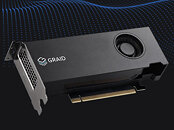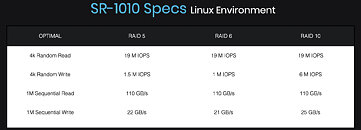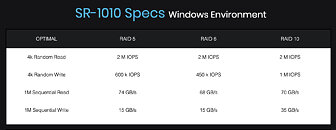Raevenlord
News Editor
- Joined
- Aug 12, 2016
- Messages
- 3,755 (1.15/day)
- Location
- Portugal
| System Name | The Ryzening |
|---|---|
| Processor | AMD Ryzen 9 5900X |
| Motherboard | MSI X570 MAG TOMAHAWK |
| Cooling | Lian Li Galahad 360mm AIO |
| Memory | 32 GB G.Skill Trident Z F4-3733 (4x 8 GB) |
| Video Card(s) | Gigabyte RTX 3070 Ti |
| Storage | Boot: Transcend MTE220S 2TB, Kintson A2000 1TB, Seagate Firewolf Pro 14 TB |
| Display(s) | Acer Nitro VG270UP (1440p 144 Hz IPS) |
| Case | Lian Li O11DX Dynamic White |
| Audio Device(s) | iFi Audio Zen DAC |
| Power Supply | Seasonic Focus+ 750 W |
| Mouse | Cooler Master Masterkeys Lite L |
| Keyboard | Cooler Master Masterkeys Lite L |
| Software | Windows 10 x64 |
GRAID Technology has announced the SupremeRAID SR-1010, which it claims is the "world's fastest NVMe and NVMeoF RAID card for PCIe Gen 4." A PCIe 4.0 evolution of the SupremeRAID SR-1000, the new SupremeRAID SR-1010 upgrades the on-board GPU RAID accelerator from the Nvidia T1000 (Turing) to an Nvidia RTX A2000 (Ampere) GPU. The improved hardware leverages the PCIe 4.0 protocol to achieve RAID speeds in excess of anything you've seen before, with sequential reads rated at 110 GBps and sequential write performance of 22 GBps. Read and write IOPS are set at 19M and 1.5M, respectively.
The change in GPU and PCIe interface means the upgraded SupremeRAID SR-1010 offers a 19% performance boost in read and an 83% write performance increase compared to the model it replaces. The GRAID SupremeRAID SR-1010 offers support for RAID 0, 1, 5, 6, and RAID 10 arrays with support for a maximum of four groups, and is capable of managing up to 32 NVMe SSDs under Linux and Windows Server 2019 and 2022 (though performance there takes a big haircut). Availability is pegged for May 1st, but GRAID didn't provide a sticker price for its GPU-powered RAID solution.



View at TechPowerUp Main Site | Source
The change in GPU and PCIe interface means the upgraded SupremeRAID SR-1010 offers a 19% performance boost in read and an 83% write performance increase compared to the model it replaces. The GRAID SupremeRAID SR-1010 offers support for RAID 0, 1, 5, 6, and RAID 10 arrays with support for a maximum of four groups, and is capable of managing up to 32 NVMe SSDs under Linux and Windows Server 2019 and 2022 (though performance there takes a big haircut). Availability is pegged for May 1st, but GRAID didn't provide a sticker price for its GPU-powered RAID solution.



View at TechPowerUp Main Site | Source



